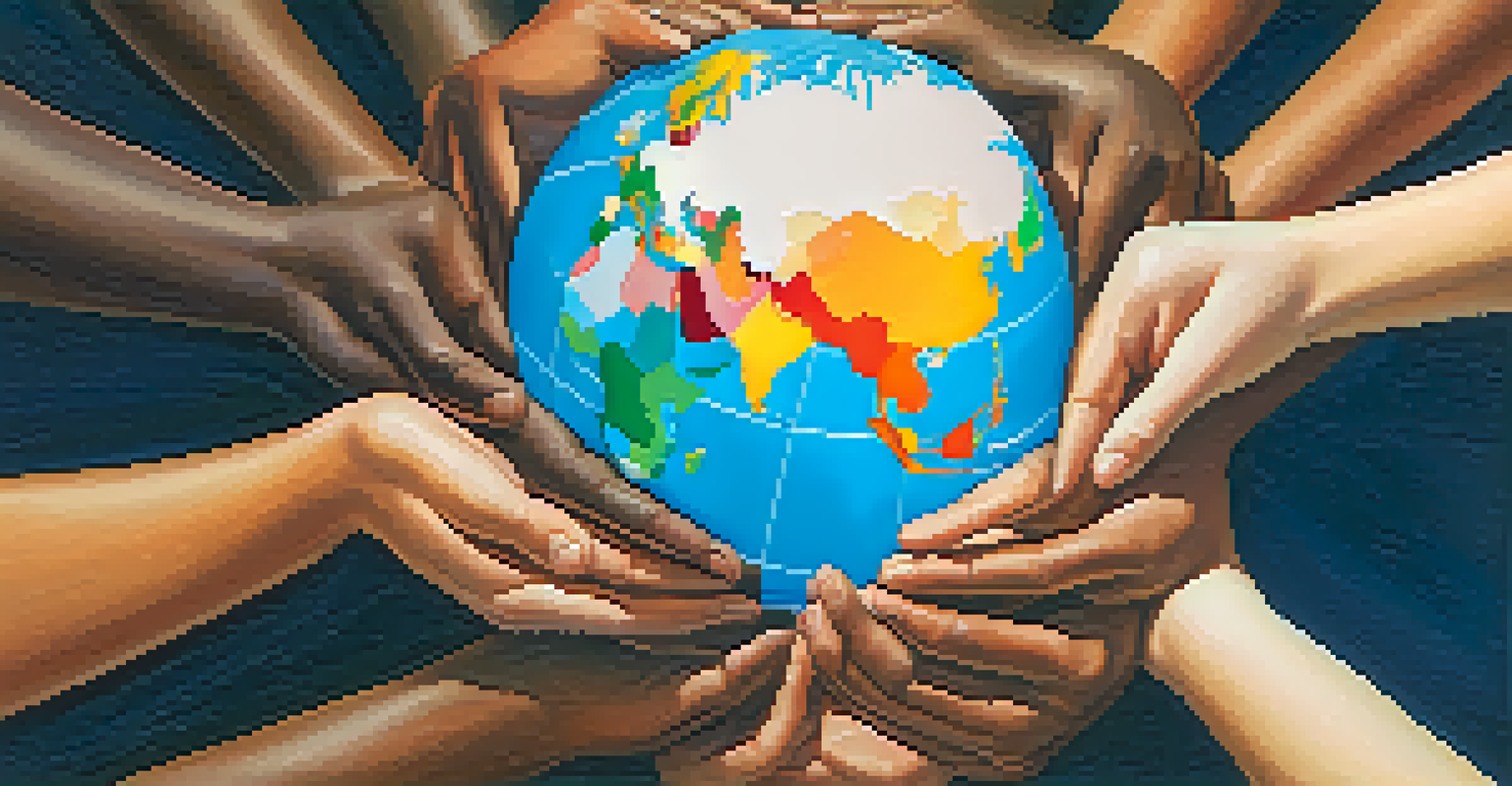The Intersection of Spirituality and Economic Justice Today

Defining Spirituality and Economic Justice
Spirituality often encompasses personal beliefs and practices that connect individuals to something greater than themselves. This can include religious faith, meditation, or a sense of purpose in life. Economic justice, on the other hand, focuses on creating a fair distribution of resources and opportunities, ensuring that everyone has access to basic needs.
The best way to find yourself is to lose yourself in the service of others.
At first glance, these two concepts may seem unrelated, but they intersect in powerful ways. Spirituality can inspire individuals to advocate for equity and challenge systems that perpetuate inequality. This connection encourages a holistic approach to addressing social issues, merging heart and mind in the quest for justice.
Understanding the relationship between spirituality and economic justice allows us to recognize the moral imperatives behind advocacy. Many activists find their motivation rooted in spiritual beliefs, driving them to fight for a more just world. This intersection forms a rich tapestry of activism that resonates with diverse communities.
Historical Context of Spirituality and Economic Justice
Throughout history, spiritual leaders have played significant roles in social justice movements. Figures like Martin Luther King Jr. and Mahatma Gandhi drew upon their spiritual beliefs to inspire change and promote economic equity. Their teachings emphasized compassion, community, and the importance of uplifting the marginalized.

Moreover, various religious traditions have long advocated for social justice, often urging followers to care for the poor and fight against systemic injustice. For example, the concept of 'tikkun olam' in Judaism highlights the responsibility to repair the world through acts of kindness and social action. These teachings remain relevant in today's struggle for economic fairness.
Spirituality Inspires Economic Justice
The intersection of spirituality and economic justice encourages individuals to advocate for equity and challenge systemic inequality.
By examining historical figures and movements, we can see how spirituality has been a driving force behind economic justice initiatives. This legacy continues to inform contemporary activism, reminding us of the power of spiritual conviction in shaping social policies and community efforts.
Modern Spiritual Movements Advocating for Justice
In today’s world, many spiritual movements are actively addressing economic injustices. For instance, organizations like the Interfaith Movement for Human Integrity blend faith with advocacy, focusing on the economic rights of immigrants and marginalized communities. These groups harness the collective power of spirituality to address pressing social issues.
Injustice anywhere is a threat to justice everywhere.
Mindfulness and meditation practices are also gaining traction as tools for social change. By fostering awareness and compassion, these practices encourage individuals to reflect on their role in the larger economic system. This introspection can lead to greater empathy and a commitment to justice.
Furthermore, many contemporary spiritual leaders are openly discussing economic topics, bridging the gap between faith and activism. They stress that spiritual fulfillment is intertwined with the well-being of all, urging followers to participate in movements that promote economic equity and community support.
Challenges at the Intersection of Spirituality and Justice
Despite the positive connections between spirituality and economic justice, challenges remain. Some individuals may feel that spirituality is too personal to engage with social issues, leading to a disconnect between personal beliefs and collective action. This sentiment can hinder progress in addressing systemic inequalities.
Additionally, the commercialization of spirituality can dilute its transformative potential. As mindfulness and wellness industries grow, there’s a risk that the deeper messages of justice and community may be overshadowed by profit-driven motives. This calls for a critical examination of how spirituality is marketed and its implications for social responsibility.
Historical Role of Spiritual Leaders
Spiritual leaders like Martin Luther King Jr. have historically driven social justice movements, emphasizing compassion and community support.
Moreover, differing interpretations of spirituality can lead to conflicts within movements. While some may prioritize individual spiritual practices, others might focus on communal action. Balancing these perspectives is essential to fostering unity in the pursuit of economic justice.
Personal Stories of Spirituality and Economic Advocacy
Personal narratives often illuminate the powerful connection between spirituality and economic justice. For many, experiences of injustice can spark a spiritual awakening, leading them to advocate for change. These stories remind us that the quest for justice is not just about policies but also about the human experience.
Consider the story of a community leader who, after a personal encounter with poverty, felt called to action. Their journey from despair to empowerment illustrates how spirituality can transform pain into purpose, motivating individuals to uplift their communities. Such narratives inspire others to see the potential for healing and growth in the fight for justice.
These testimonies also help to humanize the struggle for economic equity, making it relatable to a broader audience. When individuals share their experiences, they create a sense of solidarity and encourage collective action, reminding us that we’re all part of a larger story.
Creating a Spiritual Framework for Economic Justice
Developing a spiritual framework for economic justice involves integrating values such as compassion, stewardship, and community. These principles guide individuals towards actions that promote equity and support marginalized groups. By grounding advocacy in spiritual beliefs, activists can articulate a compelling vision for a just society.
Practices such as collective prayer, meditation, and community service can strengthen this framework. These activities not only foster connections among individuals but also create a shared commitment to justice. When communities come together, they amplify their voices and actions, making a more significant impact.
Future of Advocacy and Spirituality
Emerging movements are increasingly recognizing the importance of integrating spiritual principles into their advocacy efforts for a more equitable society.
Moreover, nurturing a spiritual framework encourages resilience in the face of challenges. It reminds activists of their purpose and the importance of self-care, helping them sustain their efforts over the long term. This holistic approach ultimately enriches the movement for economic justice.
Future Directions for Spirituality and Economic Justice
As we look to the future, the intersection of spirituality and economic justice holds tremendous potential. Emerging movements are increasingly recognizing the importance of integrating spiritual principles into their advocacy efforts. This trend suggests a growing awareness of the need for holistic approaches to social change.
Furthermore, the rise of digital platforms allows for broader conversations about spirituality and justice. Online communities can unite individuals from diverse backgrounds, fostering collaboration and shared learning. This connectivity can enhance the effectiveness of advocacy efforts, allowing them to reach wider audiences.

Ultimately, the future of this intersection will depend on our collective willingness to engage deeply with both spirituality and economic justice. By embracing these connections, we can create a more equitable world that reflects our shared values and dreams for a just society.